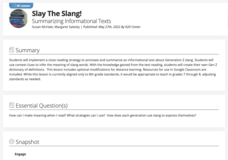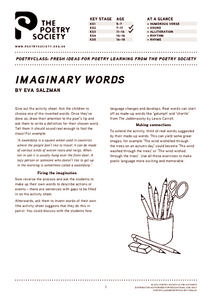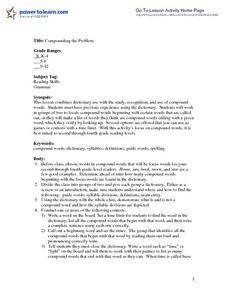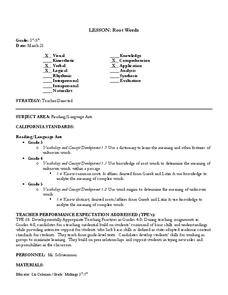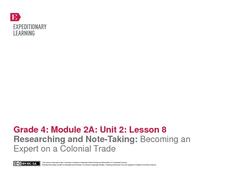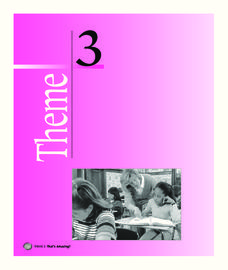Florida Center for Reading Research
Dictionary Cube
Young scholars investigate new vocabulary words with a fun, collaborative activity. Given a deck of word cards, pairs of students flip over one at a time and independently look up the term in a dictionary. They then take turns rolling a...
Florida Center for Reading Research
Vocabulary: Word Meaning, Dictionary Cube
Scholars work together to define words and answer questions using a dictionary cube.
British Council
Dictionary Skills for Secondary Students
Pop quiz! Learners work in groups to answer questions on a quiz about dictionary skills. They then work to create a dictionary skill quiz of their own. Groups exchange quizzes and race to find all of the answers.
Global Oneness Project
Cultural Heritage: Recording a Native Language Dictionary
How do you rebuild a language that has been banned for years? A short video introduces high schoolers to Marie Wilcox, A Wukchumni Native American from Central California who, for over 20 years, worked on comprising a dictionary of the...
Scholastic
Frindle Lesson Plan
"Who says a pen has to be called a pen? Why not call it a frindle?" Inspired by this quote from the award-winning novel written by Andrew Celements, this lesson allows children to invent their own terms for common classroom objects,...
K20 LEARN
Slay the Slang! Summarizing Informational Texts
Middle schoolers get hip to the jive with a lesson about slang. They closely examine examples of slang and use context clues to infer the meaning of the terms. Groups read and summarize an article about a teacher who created a Gen Z...
Core Knowledge Foundation
Third Grade Skills Unit 4: Stories of Ancient Rome
A unit covering stories of Ancient Rome examines spelling rules, suffixes, verbs, quotation marks, writing, and dictionary skills. Lessons follow a similar routine; reading, skills practice, and extension activities, followed by...
Poetry Society
Imaginary Words
Oh, what fun! Young logophiles and neologists create a dictionary-sounding definition for imaginary words and try to fool their classmates.
Houghton Mifflin Harcourt
Smart Solutions: English Language Development Lessons (Theme 6)
Smart Solutions is the theme of a unit created to meet the needs of English language earners. Through a series of lessons, scholars follow a routine—move, speak, and listen— to cover topics including stores, shops, celebrations, pets,...
Houghton Mifflin Harcourt
Around Town: Neighborhood and Community: English Language Development Lessons (Theme 3)
Here is a unit designed to support English language development. Scholars speak, move, and write to learn more about topics that focus on community and local concepts. The series of lessons aids to reinforce concepts including consonant...
Curated OER
Compounding the Problem
Pupils sharpen their dictionary skills and their understanding of compound words in this plan. Tailor it to the grade level you teach by honing in on specific skills. For older learners, the plan suggests providing a word and having them...
Haut Gap Middle School
Root Words
Scholars demonstrate their knowledge of root words aqua and aud, and develop vocabulary skills by completing of a chart, handout, and worksheet using creative thinking skills, a dictionary, and a thesaurus.
Global Oneness Project
The Importance of Indigenous Language Revitalization
Middle schoolers consider languages as representations of cultures and the importance of preserving various languages, especially the rapidly disappearing languages of indigenous peoples, in a lesson that tells the story of Marie Wilcox...
Curated OER
Learning Vocabulary by Using Reference Materials
Finding engaging ways to help your middle schoolers build their vocabulary is not easy to do. The lesson presented here offers a great way to motivate them to build vocabulary by making it into a game. Teams of pupils use a dictionary...
EngageNY
Researching and Note-Taking: Becoming an Expert on a Colonial Trade
Fourth graders work in small groups to become experts on different colonial trades in the eighth instructional activity of this unit. Working toward the long-term goal of writing a piece of historical fiction, young scholars read...
Curated OER
Word Reference Materials
A class discussion on reference materials opens up a lesson on how to use these important resources. They discover that dictionaries, glossaries, and thesauruses are called word reference resources, and they practice using them. The...
Curated OER
Understanding and Using Root Words to Expand Vocabulary
Middle schoolers engage in a lesson which reminds them that root words indicate the base meaning of a word, and that those roots are found in many different words that have similar meanings. Pairs of pupils use construction paper and...
Prestwick House
Connotative vs. Denotative Meanings
Besides the dictionary definition, words also carry the added weight of meanings that are inferred or implied, meanings conferred on words, or connotations. To gain an understanding the importance of connotation, class members engage in...
EngageNY
Resource Materials and Gathering Information: Reading Another “Choice” Text from the Research Folder
Look it up. Scholars use a dictionary and thesaurus to verify the meaning of the research vocabulary words they defined in the previous activity. They then use sticky notes to write a synonym for each word. Finally, individuals choose a...
Curated OER
Mythological Word Origins
Review myths and the characters therein, connecting them to vocabulary words in the English language today. Begin by searching online for myths and character names. With at least ten names that are familiar English words, students use...
Curated OER
When is a Noun a Verb? Examining Double Duty Words
Act and act, address and address...there are so many words in our dictionary that can function as nouns or verbs. Start this lesson by having your class list as many as they possibly can. When an adequate list presents itself, have your...
Curated OER
Finders Keepers: Vocabulary Instructional Routine Guide for Extremely Loud and Incredibly Close
Like Oskar, the curious boy in Jonathan Safran Foer’s story, class members journey through other “stories that the mouth can’t tell” to find another sentence that uses a word found in novel. Individuals create their own vocabulary list,...
Novelinks
The Tempest: A-Z Book Project
Create a picture dictionary for one of William Shakespeare's most famous plays. After readers finish The Tempest, they assign each letter of the alphabet to a concept or character, and add a description and evidence from the text to the...
Houghton Mifflin Harcourt
That’s Amazing!: English Language Development Lessons (Theme 3)
That's Amazing! is the theme of an English language development unit created by Houghton Mifflin. Following a speak, look, move, and listen routine, scholars delve into topics; seasons, weather, animals, landforms, telling time,...
Other popular searches
- Dictionary Skills
- Dictionary Skills Lesson
- Acronym Dictionary
- English Dictionary
- Dictionary and Thesaurus
- +Computer +Dictionary
- Dictionary Use
- Elementary Dictionary Skills
- Using a Dictionary
- +Biography +Dictionary
- Dictionary Skills Worksheets
- Dictionary Practice







